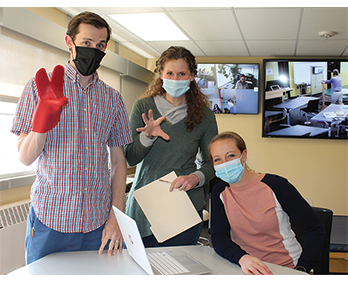Program Mission
The mission of the Occupational Therapy Program at Idaho State University is to prepare entry-level clinicians competent to meet the diverse needs of people locally, nationally, and globally by upholding the standards of occupational therapy education. The program is committed to providing high quality student-centered interdisciplinary education, scholarship, lifelong learning opportunities, and respect for cultural diversity.
Program Learning Outcomes
#1 Graduates will apply foundational concepts, knowledge of occupation, and reflective practice to competently practice as an occupational therapist.
#2 As effective consumers of the scientific literature, graduates will incorporate evidence-based decision-making into their occupational practice.
#3 Graduates will promote awareness of the impact of psycho-social issues, as part of interdisciplinary practice, on the provision and outcomes of occupational therapy in existing and emerging practice areas.
#4 As reflective practitioners, graduates will foster self-assessment skills related to professional development and a commitment to lifelong learning.
#5 Graduates will promote awareness of the unique challenges of occupational therapy practice and occupational participation in rural settings.
#6 In their provision of occupational therapy services, graduates will respect, apply, and incorporate principles of diversity and cultural competence.
Program Goals
- Educate and train students in foundational concepts and knowledge in order to competently practice as an occupational therapist.
- Educate and train students to engage in evidence-based decision-making in order to develop effective consumers of the scientific literature related to occupational therapy and other disciplines.
- Promote awareness of the impact of psychosocial issues on the provision and outcomes of occupational therapy.
- Develop reflective practitioners by fostering self-assessment skills related to professional development and a commitment to lifelong learning.
- Promote awareness of the unique challenges of occupational therapy practice and occupational participation in rural settings.
- Promote diversity and cultural competence.

Program Curricular Themes
Several fundamental themes related to the mission and philosophy of the Occupational Therapy program at Idaho State University are imbedded throughout the curriculum. The main themes are as follows:
Occupation: Occupation is seen as a central construct in the theory and practice of occupational therapy. As such, students develop an appreciation for the complexity and centrality of occupation in the daily lives of the persons they will serve. Models and theories of occupation are embedded throughout the curricula as students explore the power and potential of occupation as a medium for maximizing occupational performance, health and well-being.
Diversity: Throughout all occupational therapy courses, students gain an appreciation for the broad diversity of culture, interests, roles, and abilities and opportunities prevalent in society and Southeast Idaho.
Rural Health: Idaho and the surrounding states have considerable rural, underserved practice areas. Graduates of the program are likely to provide occupational therapy services in these rural settings. In addition, it is highly conceivable that graduates may be the only occupational therapy practitioner serving that area. With this in mind, students learn throughout the curriculum about the resources they will need to function autonomously, independently, and effectively, while still maintaining professional, ethical, and collaborative behaviors.
Interdisciplinary Education and Practice: working closely with multiple health professionals instills in students a collaborative sense of teamwork that ultimately serves to improve client care. Interdisciplinary education provides an opportunity to appreciate the core values, philosophies, and treatment interventions unique to each discipline.
Reflective Practice: with growing emphasis on accountability and clinical competency, occupational therapy practitioners must reflect on their professional behavior and clinical skills in order to identify their strengths and weaknesses and create sound professional development plans. Throughout the curriculum students are required to assess their professional behavior using a portfolio based reflection tool. Once students identify areas of weakness, they develop goals and desired outcomes for learning, and direct their learning through methods such as elective courses and extracurricular activities, rather than being dependent on the instructor for knowledge. Students learn to document their development in areas such as communication, problem-solving, time management, and critical thinking. Self-directed learning, in addition to the pedagogic content, results in competent clinicians committed to reflective practice and lifelong learning.
Evidence-based Practice: the Occupational Therapy program at Idaho State University encourages our students to embrace an evidence-based approach to the practice of occupational therapy. This approach to evidence-based practice considers research evidence together with clinical knowledge and reasoning to make judicious decisions about occupational therapy interventions. To foster clinical decision making based on best evidence, five factors should be considered: Expectation, Environment, Experience, Ethics and Evidence. [Pollock, N. and Rochon, S. (2002) becoming and evidenced-based practitioner. In M. Law (ed.) Evidenced-Based Rehabilitation. Thorofare, NJ; Slack]. An expectation acknowledges a client-centered model of practice, thereby considering the wants and needs of clients. Further, theories and frames of reference relevant to occupational therapy practice aid in establishing these expectations. The physical and social environments are also considered as key factors in clinical practice which must be addressed within the process of occupational therapy service delivery. The experience a clinician gains over years of practice also asserts a significant influence on occupational therapy practice. By acknowledging the clinical and lived experiences of a reflective practitioner, both objective and more subjective criteria may be employed within clinical practice. Ethics will also play a role within clinical decision making; involving not only professional ethics but also the personal values the reflective practitioner. Finally, effective clinical practice will require that the therapist search out and evaluate the evidence which is most relevant to a particular case; evidence derived from either naturalistic or positivistic research perspectives are valued.

